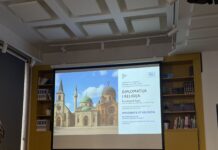Our round-up of news, notes, tips, and Tweets exhibiting how public diplomacy affects the world each and every day.
Ambassador Victor H. Ashe posted his four proposals for reforming the BBG.
As a former three year Board member, I fully agree with Secretary Clinton’s criticisms. The BBG suffers from a lack of focus, insufficient accountability and management, poor morale and a complete lack of presence on both Capitol Hill and among policymakers such that it is often – except when a problem arises – the forgotten stepchild of American foreign policy. But as often as not, while Secretary Clinton was free with her criticisms she was remarkably silent when it came to offering solutions and never attended a Board meeting. This was surprisingly unfortunate given that, by law, the Secretary is a voting member of the Board. So while she would have been free to attend all meetings of BGG as well as the Boards of RFE, RFA and MBN and thus would have been in an ideal position to impose order and reform to the organization, Secretary Clinton, like all of her predecessors, never did. She sent the Under Secretary for Public Diplomacy which office has been vacant one third of the time since its creation. It is vacant even today on January 27, 2014. [Ambassadors Perspectives]
Compelling historical narrative and public diplomacy lesson of how public speaking is more about the listeners than the speaker.
Where the two countries’ diplomats organizing this event get things wrong? Basically, neither the Ministers’ respective offices nor their Embassies in Sarajevo had devised a formula to make sure the event would work as an event. I suspect that most of the clever effort before their visit had been devoted to crafting the words of the speech, ignoring the fact that what makes a speech successful is (of course) the words themselves but also the way in which they are delivered to the audience. Thus an audience that (perhaps for good practical reasons) is standing up needs a short, punchy speech; an audience sitting down is more comfortable and can cope with something longer and more thoughtful. [Diplomatic Courier]
Who’d a thunk it? KFC, Coke don’t hold a candle to Spam as a #brand in Korea! #softpower #PublicDiplomacy @IPDGC http://t.co/ivI1xtWuqY
— Jonathan Henick (@J_Henick) January 28, 2014
Excellent article on state-controlled media; challenges for #publicdiplomacy http://t.co/HTy11u1FF6 @RobertOrttung @elliottschoolgw @IPDGC
— Jonathan Henick (@J_Henick) January 27, 2014
Why was so Kosovo so successful in its digital diplomacy efforts for recognition in 2013? It outsourced to its people.
Rather than utilize social media as a series of platforms for politicians to expound upon, Selimi and his digital diplomacy team enlisted their community to spread the word of the country’s personality, accomplishments and promise. “We don’t try to keep it inside and promote our political agenda using the internet,” he said. “That’s fishy. People don’t like that. Maybe people don’t like you as a member of a certain political party, but they want to get engaged. So we outsourced everything. We gave civil society a role.” [BIDD]
The Obama Administration has utilized economic statecraft as a way of building its relationship with Indonesia.
The Obama administration understands Indonesia’s potential as a strategic stakeholder with significant political and economic clout in an area of increasing geostrategic importance. Its economy averaged a GDP of $878.2 billion and a growth rate of 6.2% in 2012 (World Bank). The democratic government transition in 1998 advanced economic growth, lowered trade barriers, and advanced foreign investment opportunities. Since 2004, President Yudhoyono has consistently worked towards implementing economic reforms to eradicate corruption, diminish nepotism, and remove bureaucratic hurdles. Indonesia has joined the club of Southeast Asia’s rising “tiger economies” alongside Thailand, Malaysia, and the Philippines. Indonesia now constitutes an economic steam engine in the Asia-Pacific and should be regarded as a centerpiece of U.S. foreign policy in its proclaimed pivot towards Asia. [CPD Blog]
Injecting #diversity to K-pop music industry http://t.co/dqtDGfTkrj #malaysia #brunei #culturaldiplomacy #publicdiplomacy
— APDS (@USC_APDS) January 28, 2014
Interesting wording in this article pointing to an economic diplomacy focus for Iran in the coming year.
A propaganda campaign launched against Iran managed to restrict the country’s “maneuverability” in its foreign policy and international relations for a short period of time, said Iranian Deputy Foreign Minister Morteza Sarmadi on Sunday. However, he said, the new Iranian administration opted to crush the anti-Iran campaign and not allow a tarnished image of the Islamic Republic to be used to serve hegemonic powers’ interests, the official underlined. Sarmadi also underscored the importance of economic diplomacy in Iran’s foreign policy and pointed out that Iranian embassies are seriously tasked with expanding economic ties with other countries in order to “make optimum use of economic opportunities” to boost national development, reduce the costs related to progress and development, and procure basic goods as well as the technology and machinery required for production in the country. [Press TV]
Speaking of economic diplomacy (a new year theme, it seems), Sri Lanka is going the same route.
Economic diplomacy was at the forefront of Sri Lanka’s foreign relations and the country’s envoys across the world had been given explicit instructions to accord the highest priority to developing trade, investment and tourism, External Affairs Minister Prof. G. L. Peiris said in Colombo recently. He was speaking as Chief Guest at the Diplomats’ Evening, organised by the Chamber of Young Lankan Entrepreneurs (COYLE), for the third consecutive year at Colombo Hilton. [The Island]
Nancy Snow is proud of Caroline Kennedy’s controversial tweet that some criticized as a public diplomacy misstep.
This cultural context may help explain why Kennedy’s tweet caused such a furor among some Japanese. All was well as long as Kennedy tried out calligraphy, high-fived school children, and practiced some Japanese vocabulary. Celebrating Japan for being Japanese is great when you enthuse over sushi and soba, but tweeting an officialese comment on the Taiji hunt? Well now, lady, that’s going too far for some. One reporter asked me if the dolphin tweet were a “rookie mistake” for the U.S. Ambassador to Japan who has held her post just a few months. No. A rookie mistake is throwing to the wrong receiver or sliding too early. [Huffington Post]
Ruhan Jia: China’s state-sponsored pop star @GeorgiaJCatt reports @bbcworldservice http://t.co/T87oct0diJ #softpower
— Sophie West (@soph_west) January 28, 2014
China and India talk up how culinary diplomacy is improving relations along their shared border.
As part of the bilateral, cultural exchanges between the two neighbours, there should be more cuisine ties between India and China, Chinese Consul General Wang Xuefeng said today. The Tagore enthusiast, who informs a cultural troupe from his country will perform at the ‘Spring Festival here, few months from now,” is all for “Your Macher jhol (fish curry) and posto” invading his country and aid in culinary diplomacy. [Business Standard]
Here is a quick summation of Grand Challenges Canada, a science diplomacy program sponsored by the Canadian government.
Grand Challenges Canada, which is funded by the Government of Canada, supports bold ideas with big impact in global health. Our core objective is to solve critical health challenges in low- and middle-income countries. What we have found is that engaging with other countries through science diplomacy has great potential to enhance this core objective. Bold ideas for saving and improving lives can be found everywhere, and by collaborating with governments in low- and middle-income countries we can stimulate those local ideas and increase their chances for success. [Grand Challenges Canada]
#quote 6 largest nations in the world: China, India, Facebook, the United States, Twitter and Indonesia @stavridisj #digitaldiplomacy
— Juan Luis Manfredi (@juanmanfredi) January 28, 2014
photo credit: Cho Woohae / New York Times













